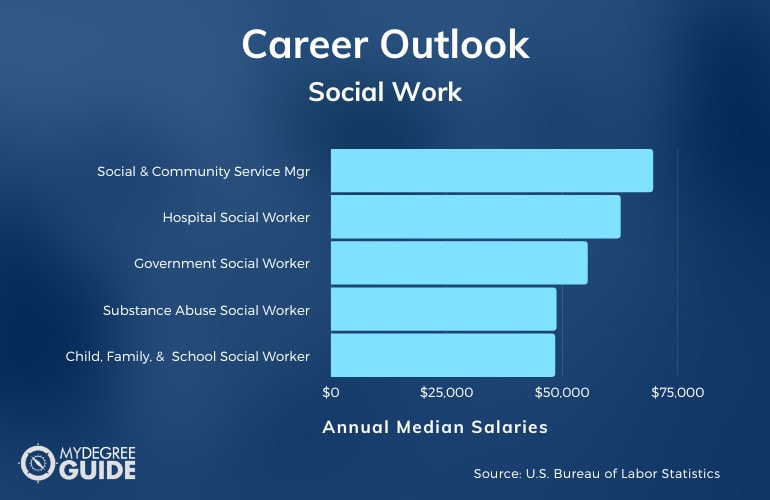Earn an accelerated social work degree online so you may enter the workforce and help people sooner. You might be finished with your degree in as short as 18 months!

Social work is a profession that grew out of a need to try to correct the ills of society. From working with individuals to working with organizations, social work puts you at the forefront of social change.
Editorial Listing ShortCode:
You may be helping people with:
- addictions
- mental illness
- family issues
- child welfare
- adoption
The US Bureau of Labor Statistics estimates there will be 78,300 NEW jobs each year in social work over the next 10 years. There is a desperate need for change-makers. For people who are dedicated to working with those who need help.
Your career may take you from an elementary school to a hospital, to a private clinic to a government agency.
Types of Accelerated Social Work Degree Programs

To become a licensed social worker, you will often need to start with a Bachelor’s of Social Work. Once you have completed your degree, you can apply for a license through your state’s licensing board.
Although there is only one social work degree, you may become a social worker with a degree in a different field. If you don’t have a bachelor’s degree in social work, you may need to get your master’s in social work before you can become a licensed social worker. There are plenty of accelerated Master’s in Social Work programs that allow students to finish much quicker than they normally would through regular master’s programs.
Areas that your social work degree might focus on are:
- Administration, Policy, and Research
- Child, Family, and School
- Community
- Gerontology
- Medical and Health
- Mental Health and Substance Abuse
- Military and Veterans
- Palliative and Hospice
- Psychiatric
Which one jumps out at you as to who you would want to help?
Accelerated Social Work Degree Programs Overview

A degree in social work can help prepare you to dive headfirst into your career. A bachelor’s degree is considered the starting point for a career in social work.
You will be taking classes like:
- Ethics in Professional Helping
- Human Behavior and the Social Environment
- Social Welfare and Policy
- Practice with Individuals and Families
- Social Work Practice with Groups
- Social Work Macro Practice
- Practice with Diverse Populations
- Chemical Dependency
- Health of the Social Work
Most programs will also include field experience and student practicums. Your degree in social work may equip you with the skills you’ll need to work with families, individuals, groups and diverse populations.
Careers with an Accelerated Social Work Degree

You may start out in social assistance case management (and stay there) with an average annual salary of $38,520. Case management typically involves connecting people with the resources they need whether leaving the hospital or navigating family life.
Are you wanting to pursue more clinical social work, where you are involved in the diagnosing and treatment of mental disorders? Or become a higher level administrator? You may be interested in pursuing an MSW online program no GRE which could result in your salary jumping up to an average of $55,000 (Center on Education and the Workforce).
According to the Bureau of Labor Statistics, some careers in the social work field include:
| Career | Annual Median Salary |
| Social and Community Service Manager | $69,600 |
| Hospital Social Worker | $62,580 |
| Government Social Worker | $55,460 |
| Mental Health and Substance Abuse Social Worker | $48,720 |
| Child, Family, and School Social Worker | $48,430 |
A degree in social work may be both a launching point for your career or the focus of your career. Famous actor Samuel L. Jackson majored in social work and worked in Los Angeles for 2 years as a social worker in the early 1970s.
Although he moved into an acting career, he is still a champion for supporting the disadvantaged to pursue education, as well as civil rights and helping those with Alzheimer’s disease.
Once a social worker, always a social worker!
Why Enroll in an Online Accelerated Social Work Program?

You know you want to study Social Work; now why not make it as quick and convenient as possible? Here’s what an online accelerated program has to offer.
No waiting! You don’t need to wait until next semester to start your degree. Most universities will offer variable start dates.
No wasting time! Instead of spending 16 weeks in a class for the normal semester, you may be done in 6-8 weeks. The same class material. The same assignments. But at double the speed. Which allows you to take twice as many classes in the same amount of time.
No commute or schedule to follow! You don’t need to go to campus or attend class at a certain time. You can do your schoolwork wherever you are, whenever is most convenient for you.
Editorial Listing ShortCode:
3 Ways to Accelerate Your Social Work Degree Even More
Besides taking accelerated classes, you may use these three techniques to get your social work degree even quicker.
1. Test Out of College Classes (You Save Up to 1 Year!)
Don’t take classes when you can get the credit by taking the exam instead. You can register with the College Level Examination Program to take a standardized test, which usually consists of 90 multiple choice questions, for $89. If you pass with at least 50%, you may full credit for that class. Most exams are worth 3 credits.
You may buy a study guide for subjects you need to brush up on, and most universities will allow up to 30 credits through credit by exam. That’s a full year of classes you wouldn’t need to take.
2. Get College Credit for Your Life and Work Experience (Save another Semester!)
If you have been working or have served in the military or have lived in a foreign country, you may apply to your school to earn credit for prior learning.
This could be:
- a course you have taken through work
- on the job training
- volunteer or even overseas work
Any of these experiences can often be pulled together in a portfolio and submitted to your school’s advisor.
You’ve already done the work. You just need to put it together in the format your school wants. When you do, you might earn up to 15 credits, a full semester’s worth of classes, for your previous experiences.
3. Take the Max Number of Classes Year-Round (Earn Almost Double the Credits!)
Most college students take 15 credits per semester. That’s 30 credits per year and takes a full 4 years to finish.
But most universities will allow you to take almost double the credits in a year. You can take 18 credits per semester, and you can also take classes in the summer. That gives you 3 semesters per year and 54 credits.
Bonus: Transferring Your Existing College Credits
Do you have college credit from attending classes before? You may be able to transfer it and apply it to your new degree.
Just check these two criteria:
- The class was from an accredited college
- You earned at least a C in the class
Even if that previous class doesn’t fit into your Social Work degree, it may be used for your elective classes. Taking fewer classes can often save you both time and money in completing your degree.
Social Work Degree Accreditation

For your degree to be valid, make sure you attend an accredited school. You cannot become a licensed social worker if your bachelor’s degree is not from an accredited college or university.
Your school could be accredited by one of these regional boards:
- Higher Learning Commission (HLC)
- Middle States Commission on Higher Education (MSCHE)
- New England Commission of Higher Education (NECHE)
- Northwest Commission on Colleges and Universities (NWCCU)
- Southern Association of Colleges and Schools Commission on Colleges (SACSCOC)
- WASC Senior College and University Commission (WSCUC)
The Social Work program may also be accredited by the Council on Social Work Education (CSWE).
Also, check out The National Association of Social Workers (NASW) for more information on what it will take to become licensed in your state.
Financial Aid for Online Social Work Students

Even though you’re taking classes online, you may still be eligible for most of the same financial aid opportunities. Start with the Free Application for Federal Student Aid (FAFSA) to see the funds available to you in grants and loans.
You can then add to this by applying to state funding, private scholarships, and of course, scholarships from your university. Also, talk to your employer about tuition assistance programs.
How Quickly Can You Finish?
Are you ready to engage and change the world? If you take accelerated classes year-round, earn 30 credits by exam, and earn another 15 for your previous experience, you might be finished in 18 months and either entering the workforce or starting your master’s degree.

